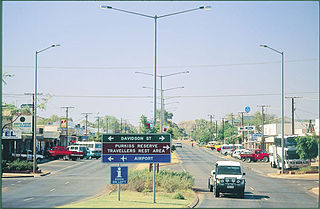
Tennant Creek is a town located in the Northern Territory of Australia. It is the seventh largest town in the Northern Territory, and is located on the Stuart Highway, just south of the intersection with the western terminus of the Barkly Highway. At the 2016 census, Tennant Creek had a population of approximately 3,000, of which more than 50% (1,536) identified themselves as indigenous.

Barkly is an electoral division of the Legislative Assembly in Australia's Northern Territory. It was first created in 1974, and is named after the Barkly Tableland area, which occupies much of the electorate. Barkly is a rural electorate, covering 442,868 km² and taking in the towns of Tennant Creek, Borroloola, Ali Curung, Warrego, Tara Aboriginal Community and Alpururulam. There were 5,690 people enrolled in the electorate as of August 2020.

The Barkly Tableland is a rolling plain of grassland in Australia. It runs from the eastern part of the Northern Territory into western Queensland. It is one of the five regions in the Northern Territory and covers 283,648 square kilometres (109,517 sq mi), 21% of the Northern Territory. The Barkly Tableland runs parallel to the southern shore of the Gulf of Carpentaria, from about Mount Isa, Queensland to near Daly Waters.
The Kurrama people, also known as the Puutu Kunti Kurrama people, are an Aboriginal Australian people from the Pilbara region of Western Australia.

Yirrkala is a small community in East Arnhem Region, Northern Territory of Australia, 18 kilometres (11 mi) south-east from the large mining town of Nhulunbuy, on the Gove Peninsula in Arnhem Land. It population comprises predominantly Aboriginal Australians of the Yolngu people, and it is also home to a number of Mission Aviation Fellowship pilots and engineers based in Arnhem Land providing air transport services.
Wambaya is a Non-Pama-Nyungan West Barkly Australian language of the Mirndi language group that is spoken in the Barkly Tableland of the Northern Territory, Australia. Wambaya and the other members of the West Barkly languages are somewhat unusual in that they are suffixing languages, unlike most Non-Pama-Nyungan languages which are prefixing.

The Kaytetye, also written Kaititya, and pronounced kay-ditch, are an Aboriginal Australian people who live around Barrow Creek and Tennant Creek in the Northern Territory. Their neighbours to the east are the Alyawarre, to the south the Anmatyerre, to the west the Warlpiri, and to the north the Warumungu. Kaytetye country is dissected by the Stuart Highway.

Utopia is an Aboriginal Australian homeland area formed in November 1978 by the amalgamation of the former Utopia pastoral lease with a tract of unalienable land to its north. It covers an area of 3,500 km2 (1,400 sq mi), transected by the Sandover River, and lies on a traditional boundary of the Alyawarre and Anmatyerre people, the two Aboriginal language groups which predominate there today.
Mary Alice Ward was an Australian teacher and pastoralist born at Kooringa, Burra, South Australia. She is best remembered for her legendary hospitality as owner and operator of Banka Banka Station, a cattle station and World War II supply camp. In fact, she was known as "The Missuss of Banka Banka."
The Warumungu are a group of Indigenous Australians of the Northern Territory. Modern day Warumungu are mainly concentrated in the region of Tennant Creek and Alice Springs.
The Yawuru, also spelt Jawuru, are an Indigenous Australian people of the Kimberley region of Western Australia.
Peggy Rockman Napaljarri is a Warlpiri-speaking Indigenous artist from Australia's Western Desert region. Born on what is now Tanami Downs pastoral station in the Northern Territory, she learned English when working as a child with a white mining family; Peggy Rockman and her family were subsequently relocated by government authorities to Lajamanu, a new community west of Tennant Creek. Peggy Rockman is one of the traditional owners of Tanami Downs.

Muckaty Station, also known as Warlmanpa, is a 2,380-square-kilometre (920 sq mi) Aboriginal freehold landholding in Australia's Northern Territory, 110 kilometres (68 mi) north of Tennant Creek, and approximately 800 kilometres (500 mi) south of Darwin. Originally under traditional Indigenous Australian ownership, the area became a pastoral lease in the late 19th century and for many years operated as a cattle station. It is traversed by the Stuart Highway, built in the 1940s along the route of the service track for the Australian Overland Telegraph Line. It is also crossed by the Amadeus Gas Pipeline built in the mid-1980s, and the Adelaide–Darwin railway, completed in early 2004. Muckaty Station was returned to its Indigenous custodians in 1999.

Walhallow Station also once known as Walhallow Downs often just referred to as Walhallow is a pastoral lease that operates as a cattle station in the Northern Territory of Australia.

Mittiebah Station, mostly referred to as Mittiebah, is a pastoral lease operating as a cattle station in the Northern Territory of Australia.
The Binigura people, these days usually spelt Pinikura, are an Aboriginal Australian people of the Pilbara region of Western Australia.
The Kokatha, also known as the Kokatha Mula, are an Aboriginal Australian people of the state of South Australia. They speak the Kokatha language, close to or a dialect of the Western Desert language.
The Kukatj are an Aboriginal Australian people of the Cape York Peninsula in the state of Queensland. They are to be distinguished from the Kukatja of Western Australia and the Luritja of the Northern Territory, who have also historically been known as Kukatja.

Tablelands is a locality in the Northern Territory of Australia located about 858 kilometres (533 mi) south-east of the territory capital of Darwin.

Ali Curung is an Indigenous Australian community in the Barkly Region of the Northern Territory. The community is located 170 km (106 mi) south of Tennant Creek, and 378 km (235 mi) north of Alice Springs. At the 2016 census, the community had a population of 494.